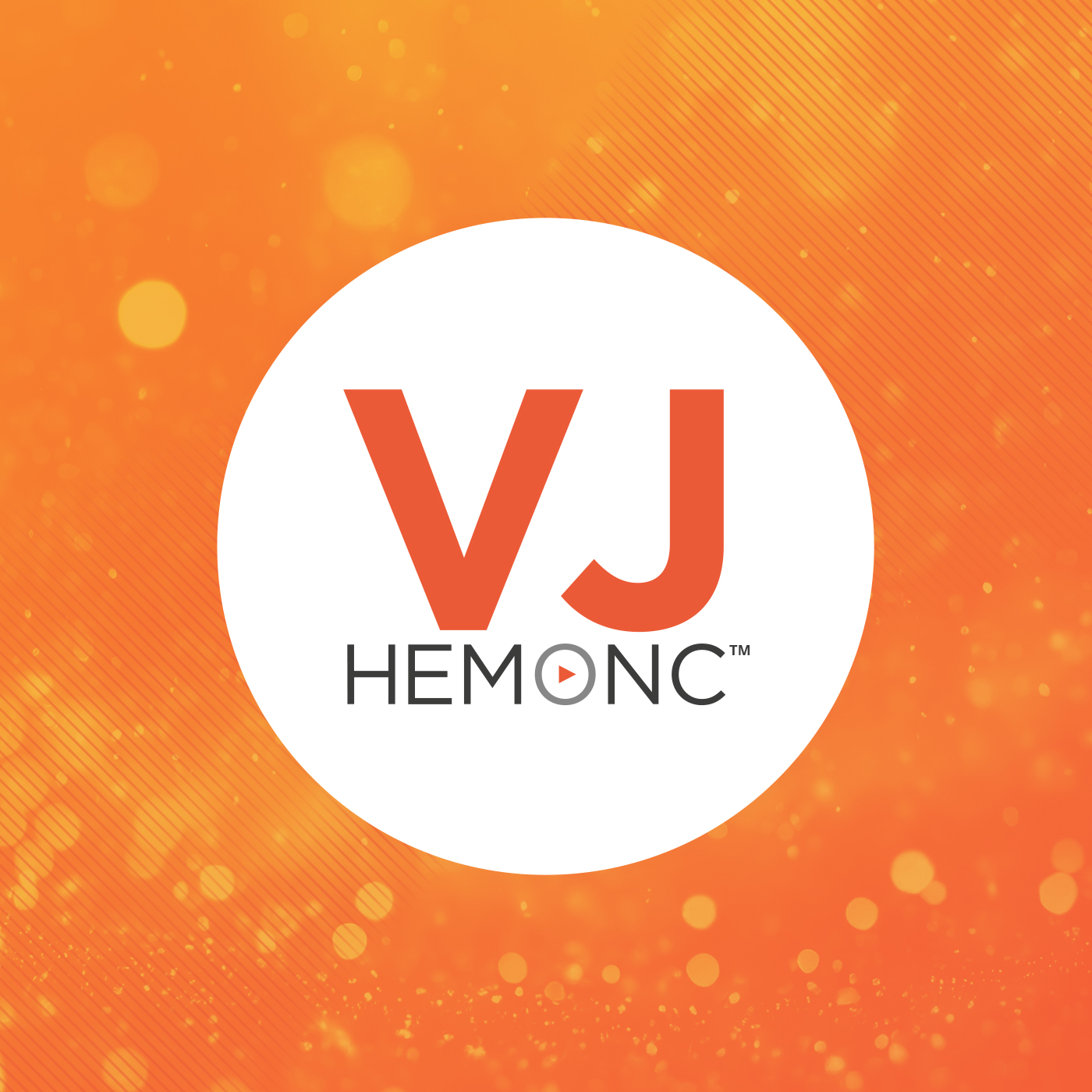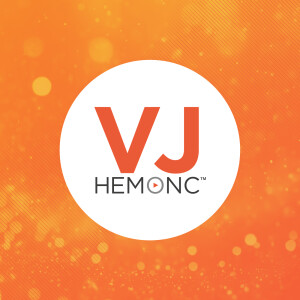
75.2K
Downloads
318
Episodes
The Video Journal of Hematology and Hematological Oncology (VJHemOnc) podcast covers the latest hematological oncology and hematology news from international experts – from leukemias, lymphomas, MDS and MPNs, to sickle cell, aplastic anemia and rare diseases. Made for healthcare professionals and researchers, we are a global, independent, open-access platform. Listen to the latest news, including cutting-edge trial updates, controversies and opinion. If you enjoy the podcast, please leave us a rating and review! For more news visit www.vjhemonc.com
The Video Journal of Hematology and Hematological Oncology (VJHemOnc) podcast covers the latest hematological oncology and hematology news from international experts – from leukemias, lymphomas, MDS and MPNs, to sickle cell, aplastic anemia and rare diseases. Made for healthcare professionals and researchers, we are a global, independent, open-access platform. Listen to the latest news, including cutting-edge trial updates, controversies and opinion. If you enjoy the podcast, please leave us a rating and review! For more news visit www.vjhemonc.com
Episodes

Tuesday Dec 06, 2022
iwAL 2022 Session V: Mechanisms of resistance to targeted therapies in AML
Tuesday Dec 06, 2022
Tuesday Dec 06, 2022
The 4th International Workshop on Acute Leukemias (iwAL) 2022 took place in Nice, France, and brought together leading experts in the field as they discussed several topics. In this podcast series, you will hear the latest updates in acute myeloid leukemia (AML) and acute lymphoblastic leukemia (ALL) and gain an insight into the sessions that took place at this year’s meeting.
In this podcast, Naval Daver, MD, The University of Texas MD Anderson Cancer Center, Houston, TX, Paresh Vyas, MRCP, FRCP, FRCPath, Weatherall Institute of Molecular Medicine, University of Oxford, Oxford, UK, Alexander Perl, MD, University of Pennsylvania, Philadelphia, PA, and Carsten Müller-Tidow, MD, University Hospital Heidelberg, Heidelberg, Germany, discuss mechanisms of resistance to targeted therapies in AML, and the role of epigenetics.

Friday Dec 02, 2022
Friday Dec 02, 2022
Chronic lymphocytic leukemia (CLL) remains a challenging hematological malignancy to treat, and genomic testing has become increasingly important in this disease. Several genomic tests are commonly carried out prior to initiating treatment, including testing for TP53 aberrations, IgHV mutational status, and more.
In this podcast, you will hear from Lydia Scarfò, MD, Vita-Salute San Raffaele University & IRCCS San Raffaele Scientific Institute, Milan, Italy, Nitin Jain, MD, University of Texas MD Anderson Cancer Center, Houston, TX, Richard Rosenquist, MD, PhD, Karolinska Institute, Stockholm, Sweden, Florence Cymbalista, MD, Hôpital Avicenne, Bobigny, France, and Paolo Ghia, MD, Università Vita-Salute San Raffaele, Milan, Italy, who discuss the importance of genomic testing in CLL and how this impacts treatment decisions.

Wednesday Nov 30, 2022
iwNHL Session IV: T-cell therapies for NHL: CAR-T therapies & third-party EBV T-cells
Wednesday Nov 30, 2022
Wednesday Nov 30, 2022
The 19th International Workshop on Non-Hodgkin Lymphoma (iwNHL) 2022 took place in Barcelona, Spain, and brought together leading experts in the field as they discussed several topics. In this podcast series, you will hear the latest updates in NHL and gain an insight into the sessions that took place at this year’s meeting.
In this podcast, Catherine Bollard, MBChB, MD, FRACP, FRCPA, Children's National Health System, Washington, DC, Jeremy Abramson, MD, Massachusetts General Hospital Cancer Center, Boston, MA, Barbara Savoldo, MD, PhD, UNC School of Medicine, Chapel Hill, NC, and Maksim Mamonkin, PhD, Baylor College of Medicine, Houston, TX, discuss the latest updates in T-cell therapies for the treatment of NHL, commenting on real-world data on CD19-directed CAR-Ts, and exploring the potential of other T-cell therapies including CD30, CD20, and CD5-directed CAR-Ts in T-cell lymphomas.

Friday Nov 25, 2022
Friday Nov 25, 2022
The treatment landscape of chronic lymphocytic leukemia (CLL) has transformed over the years with the increased use of Bruton's tyrosine kinase (BTK) inhibitors, which have demonstrated promising results in several clinical trials.
In this podcast, leading experts Nitin Jain, MD, University of Texas MD Anderson Cancer Center, Houston, TX, and Catherine Coombs, MD, UC Irvine Health, Orange, CA, discuss key updates in CLL, including the changing role of chemotherapy in the era of novel agents, the promise of next-generation BTK inhibitors, and more. This discussion took place at the 10th Annual Meeting of the Society of Hematologic Oncology (SOHO), which was held in Houston, TX, from September 28-October 1.

Tuesday Nov 22, 2022
Tuesday Nov 22, 2022
The 4th International Workshop on Acute Leukemias (iwAL) 2022 took place in Nice, France, and brought together leading experts in the field as they discussed several topics. In this podcast series, you will hear the latest updates in acute myeloid leukemia (AML) and acute lymphoblastic leukemia (ALL) and gain an insight into the sessions that took place at this year’s meeting.
In this podcast, you will hear from Bijal Shah, MD, H. Lee Moffitt Cancer Center, Tampa, FL, Sabina Chiaretti, MD, PhD, Sapienza University of Rome, Rome, Italy, Elias Jabbour, MD, The University of Texas MD Anderson Cancer Center, Houston, TX, and Nicolas Boissel, MD, PhD, Saint-Louis Hospital, Paris, France, who discuss the evolving treatment landscape in ALL, debating the role of immunotherapies, including antibody-drug conjugates (ADCs) and CAR-T cells.

Friday Nov 18, 2022
Friday Nov 18, 2022
The 19th International Workshop on Non-Hodgkin Lymphoma (iwNHL) 2022 took place in Barcelona, Spain, and brought together leading experts in the field as they discussed several topics. In this podcast series, you will hear the latest updates in NHL and gain an insight into the sessions that took place at this year’s meeting.
This podcast episode focuses on the optimal management of relapsed/refractory (R/R) follicular lymphoma (FL), where you will hear from Laura Pasqualucci, MD, Columbia University Irving Medical Center, New York, NY, Jessica Okosun, MA, MB BChir, MRCP, FRCPath, PhD, Barts Cancer Institute, Queen Mary University of London, London, UK, and David Qualls, MD, Memorial Sloan Kettering Cancer Center, New York, NY. The experts debate on how to best treat, combine, and sequence therapies in R/R FL, and further comment on the role of epigenetic alterations in this disease.

Wednesday Nov 16, 2022
iwAL 2022 Session III: Novel targets, combinations and treatment strategies in AML
Wednesday Nov 16, 2022
Wednesday Nov 16, 2022
The 4th International Workshop on Acute Leukemias (iwAL) 2022 took place in Nice, France, and brought together leading experts in the field as they discussed several topics. In this podcast series, you will hear the latest updates in acute myeloid leukemia (AML) and acute lymphoblastic leukemia (ALL) and gain an insight into the sessions that took place at this year’s meeting.
In this podcast, Richard Stone, MD, Dana-Farber Cancer Institute, Boston, MA, David Sallman, MD, H. Lee Moffitt Cancer Center, Tampa, FL, and Thomas Cluzeau, MD, PhD, Central University Hospital of Nice, Nice, France, discuss novel targets and combinations in AML, treatment approaches for patients with TP53-mutated disease, and more.

Friday Nov 11, 2022
Friday Nov 11, 2022
The 10th Annual Meeting of the Society of Hematologic Oncology (SOHO) was held in Houston, TX, from September 28-October 1, and brought together leading experts to discuss recent advances in hematological malignancies.
In this podcast, you will hear from experts Jorge Cortes, MD, Augusta University, Augusta, GA, and Mhairi Copland, MB ChB, PhD, University of Glasgow, Glasgow, UK, who discuss the latest in chronic myeloid leukemia (CML), including treatment strategies for patients with multiple refractory disease, and novel agents in the field. The experts also comment on clinical trial updates, including data from the OPTIC trial (NCT02467270) and the ASCEMBL trial (NCT03106779).

Wednesday Nov 09, 2022
Wednesday Nov 09, 2022
The 19th International Workshop on Non-Hodgkin Lymphoma (iwNHL) 2022 took place in Barcelona, Spain, and brought together leading experts in the field as they discussed several topics. In this podcast series, you will hear the latest updates in NHL and gain an insight into the sessions that took place at this year’s meeting.
The second session from iwNHL focused on the role of the tumor immune microenvironment in lymphoma. In this podcast, John Gribben, MD, DSc, FRCP, FRCPath, FMed Sci, Barts Cancer Institute, London, UK, Stephen Ansell, MD, PhD, Mayo Clinic, Rochester, MN, John Kuruvilla, MD, FRCPC, Princess Margaret Cancer Center, Toronto, Canada, and Gaël Roué, PhD, Josep Carreras Leukemia Research Institute, Barcelona, Spain, discuss the importance of understanding the tumor immune microenvironment in NHL. The experts outline strategies to engage the innate and adaptive anti-tumor immune response, and explain how this can be used to enhance the efficacy of immune therapies.

Friday Nov 04, 2022
iwAL 2022 Session II: Novel treatment strategies in ALL
Friday Nov 04, 2022
Friday Nov 04, 2022
The 4th International Workshop on Acute Leukemias (iwAL) 2022 took place in Nice, France, and brought together leading experts in the field as they discussed several topics. In this podcast series, you will hear the latest updates in acute myeloid leukemia (AML) and acute lymphoblastic leukemia (ALL) and gain an insight into the sessions that took place at this year’s meeting.
In this podcast, Robin Foà, MD, Sapienza University of Rome, Rome, Italy, Rob Pieters, MD, PhD, Princess Máxima Center for Pediatric Oncology, Utrecht, The Netherlands, Nicholas Short, MD, The University of Texas MD Anderson Cancer Center, Houston, TX, and Nicolas Boissel, MD, PhD, Saint-Louis Hospital, Paris, France, discuss novel treatment strategies in ALL, including the role of combination approaches and antibody drug conjugates, and more.
